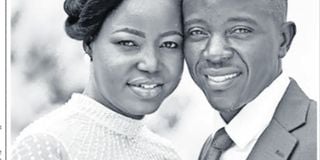Prime
Sickness and pain brought us closer

The couple cuts cake on their wedding anniversary. PHOTOS/MEGAPIX
What you need to know:
- Joseph Ssemakula and Josephine Watera tied he knot in May 2008.
- Their Marriage had been like many other until a cancer diagnosis was made.
- Josephine had to undergo treatment as Joseph took care of their children and home
Joseph Ssemakula and Josephine Watera met at Makerere University in 2004 at the library.
“One weekend, I went to the School of Education library and sat on the same table with Joseph. He had a book on management studies and I picked interest in reading it,” Josephine recalls.
The two became friends over books, and Joseph introduced her to a management forum that would meet every Thursday.
“We would attend the meeting, listen to different presentations together and our friendship grew as we talked about our takeaways,” Josephine says.
Beginning
“After the Covid-19 vaccination season in 2021, I started feeling a bit of discomfort in my breasts. I thought it was an ovulation issue but the discomfort persisted. I went to Kampala Hospital for examination and general consultation,” Josephine says.
She adds that the doctor recommended that she goes for a mammogram. Josephine went to different imaging centres in Kampala but settled for the Kololo centre.
“When I was told to go for the mammogram, there was fear of the unknown. I had a mixed bag of emotions. Anxiety overrode and I was praying that the results would not turn out bad,” she shares.
After requesting a mammogram, she was encouraged by her husband to stand strong.
“Joseph kept me calm with words of encouragement and said we were in the crisis together, we would overcome no matter the outcome of the screening,” she recounts.
“When the results came out, the woman who was supposed to write the report felt the need to do something additional because something did not look right, which she decided to follow up on,” says Josephine.
The woman told her there was a growth in her breasts and she went back to Kampala Hospital.
“The woman at Kampala Hospital advised me to do a biopsy that involved taking some samples in an area suspected to have cancer, but the hospital did not have the facility. I was referred to another health facility,” she adds.
Samples were sent to different laboratories but the results were contradictory. She underwent another biopsy which produced the same unclear results.
“We decided to seek medical advice in another advanced medical facility where we did a PET scan in Nairobi,” she says.
Treatment journey
When Josephine did the PET scan, the results confirmed cancer in one of her breasts. She had to do another biopsy in Nairobi, Kenya.
“After all the confirmations, I was started on chemotherapy where the doctor would have to administer eight cycles. Every three weeks I would get a chemo cycle,” Josephine recalls.
After chemotherapy in March 2022, she waited for a month before she had a left breast mastectomy.
Afterwards, Josephine was started on radiotherapy.
“The treatment was from May 14 to June 25 for 30 sessions,” she explains. Adding she had to undergo reviews every three months.
“In April 2023, by God’s grace, I responded very well to the treatment and there is no sign of the tumour in my body. I thank God because it was a tough season and Sanlam insurance covered the treatment expenses.
“I am undergoing hormonal therapy that comes after all the treatment, and I have been feeling pain in my hand that arose after the surgery. I am getting medication for that but insurance still covers that,” she adds.
Missed plans?
“The cancer did not stop any of the plans I had, it gave me a chance to reflect on my PhD studies that I started in 2020,” she says. At the time she was getting treatment in Nairobi, Josephine was supposed to move to South Africa to collect data but she created a plan B.
“When I got approval, I got connected with people who became part of my data collection team. So, while getting treatment at the hospital, I would be interviewing Members of Parliament for my study,” she relates.
She says at the time she explored new options in her career.
“I got to know of an application to be a member of an Independent Evaluation Panel by the Global Fund that was advertised and someone sent it to me. I applied and was shortlisted,” she adds.
Balancing family roles
“My husband was heavily involved in taking care of the children and checking on me,” she says.
Josephine notes that she encouraged him to keep focused on their children since she had family with her in Nairobi.
“We had to make a choice and we decided my husband would deal with the children and ensure they have all they need while I was away,” she recalls.
“He had to step up in taking care of the home because when I had the surgery I had to be in Nairobi for a month and when I did radiotherapy, I spent six weeks in Nairobi, so I could not do much at home,” she recalls.
Advice
Joseph says married men have to step up when a spouse is physically sick. He adds that when difficulties happen in a marriage, a couple becomes closer.
“It’s in the difficult days that you realise you need your spouse around,” Joseph says.




